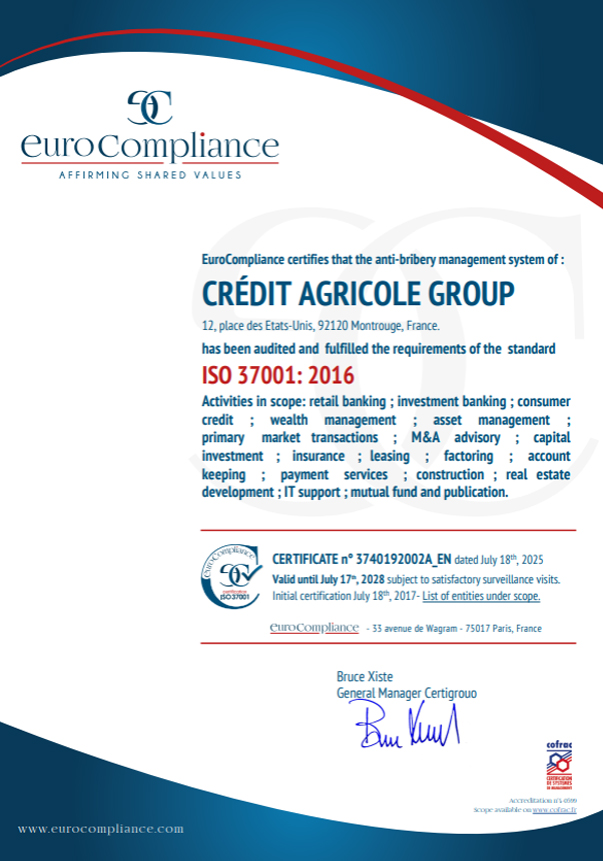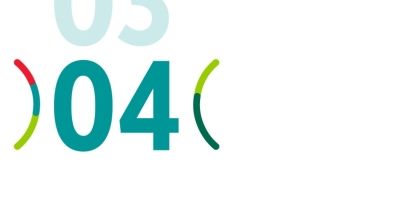-
View article
 #Financial publications
#Financial publicationsInterview with Olivier Gavalda - Results that reflect teams’ commitment to serving our customers and society
2026/02/04 -
View article
 #Financial publications
#Financial publicationsInterview with Clotilde L’Angevin - Significant full-year earnings and a transitional fourth quarter marked by the launch of the new MTP
2026/02/04
Fighting against corruption and influence peddling
Since 2011, the Crédit Agricole Group has been resolutely committed to the fight against corruption and influence peddling with a zero tolerance policy. The system was strengthened in 2017 as part of the application of regulatory obligations related to the Sapin II law.
This commitment enabled the Crédit Agricole Group to become the first French bank to obtain ISO 37001 certification for its system, recognising its commitment and the quality of its prevention program by not accepting any form of corruption or influence peddling. This certification is renewed every three years.
ISO 37001 certification
How does the Group fight against corruption?
A "zero tolerance" policy
The fight against corruption and influence peddling within the Crédit Agricole Group is based on a zero tolerance policy and the implementation of effective measures as part of a program aimed at :
- Guarantee transparency and loyalty to customers,
- Contribute to the integrity of financial markets,
- Prevent reputational risk and the risk of criminal, administrative and disciplinary sanctions,
- Fight against fraud.
Governance and management of the anti-corruption system.
Governance and management at the highest level, reflecting the commitment of the management body, with the appointment of an anti-corruption officer in each entity and a system deployed in accordance with the requirements of the regulations.
The Crédit Agricole Group's anti-corruption system, the deployment of which is monitored by the regular involvement of governance bodies (including the Board of Directors), is based on dedicated governance, updated risk maps and a comprehensive risk management system including an educational and operational anti-corruption code of conduct, which is integrated into the internal rules and regulations and specifies the appropriate behaviour to be adopted by employees when faced with high-risk situations, an internal whistleblowing system to protect employees, a third-party assessment system and a specific employee training program.
The Group's anti-corruption system is based in particular on :
- A commitment from the management bodies,
- A risk map,
- A risk management system.
A whistleblower device deployed in all Crédit Agricole Group entities
Alert rights
For the Group's employees, the right to alert is a commitment of the Ethics Charter. The facts reported may concern cases of corruption, fraud, money laundering, discrimination, harassment, etc.
The prevention measures have been supplemented by the implementation of a right to alert.
If an employee witnesses a malfunction, an offence or a crime within his or her entity, the hierarchical channel is to be preferred. However, if reporting through the hierarchy proves ineffective or unsuitable for the situation (fear of reprisals, pressure from the hierarchy, hierarchy involved, etc.), the employee can exercise his or her right to alert, in complete confidentiality, via the secure platform, which is also open to third parties.
In accordance with the Sapin 2 law of 9 December 2016, when the employee acts in a disinterested manner and in good faith concerning facts of which he or she has personal knowledge, he or she benefits from the legal protection of the whistleblower. They can choose to give their name or remain anonymous, but will always be able to exchange with the person in charge of handling the alert via the secure "dialogue box".
The platform can be accessed via the internet at any time and from any place at the following link:
https://www.bkms-system.com/Groupe-Credit-Agricole/alertes-ethiques


